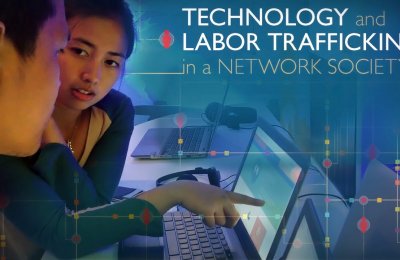By Amelia Brodka
Student Writer
“New technologies are unlocking unprecedented political potential,” said communication professor Christopher Holmes Smith as he introduced Irene S. Wu, Yahoo! fellow in residence, director of research at SAND-MNIA International Bureau of the Federal Communications Commission and a Georgetown University professor (watch the full video).
Wu's March 3 presentation, “From the Telegraph to the Internet: How both governments and protestors exploit new communications technologies” was part of the Media, Economics and Entrepreneurship speaker series. M{2e} is an initiative intended to spark dialogue around the way in which economic principles can unlock insight in our media systems.
Smith described Wu's research as a historical outline of “how the old media infrastructure of the seeming past intersects and energizes the new media environment and the new media platforms that we're already rapidly beginning to take for granted.”
Wu began her analysis of how activists and protestors have developed progressive networks through new communications technologies with the example of The South-East Asia Earthquake and Tsunami Blog. This blog, written by a consistently growing group of volunteers, was the main source of information and communication about the immediate effects of the tsunami, which claimed more than 250,000 lives. People were able to provide information immediately after the disaster, when institutions were not yet able to gather or release information.
She said that the fact that the blog received the highest amount of Web traffic in the world in the days immediately following the tsunami proves that “the richness of the interaction online has arrived at a point where it rivals the face to face interaction that we usually see and associate with communities."
She dove deeper into the history of communication by discussing the use of the telegraph to express public opinion in 20th-century China. By linking the Chinese population throughout China to the Chinese population overseas through a series of telegrams that were reprinted in newspapers, the telegraph helped stir a political movement that led to the release of Emperor Guangxu from house arrest.
She also discussed similar communication-technology fueled movements that occurred in Brazil and Canada.
With each example, she encouraged the audience to think critically. She asked them to respond to questions after each example: “What are these networks composed of? People, machines, or ideas? Who or what gives their information meaning? What is the scale of the community?”
“Information is a kind of capital and ammunition,” Wu said. She discussed the way in which activists throughout history have been readily capable of adopting and adapting new communication technology to build like-minded communities and meet their political goals.
“Whether it's ethnic groups, religious groups or socioeconomic classes, I think it’s possible to think about society as divided up into different network communities,” Wu said. “But if we think of them as a network community tied together by technology, sharing a certain information, then perhaps it is possible to be able to discern a common worldview amongst them and as a coding unit and as an economic unit, we might be able to explain behavior.”








